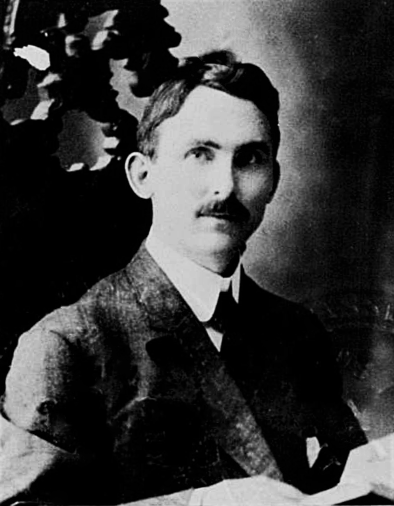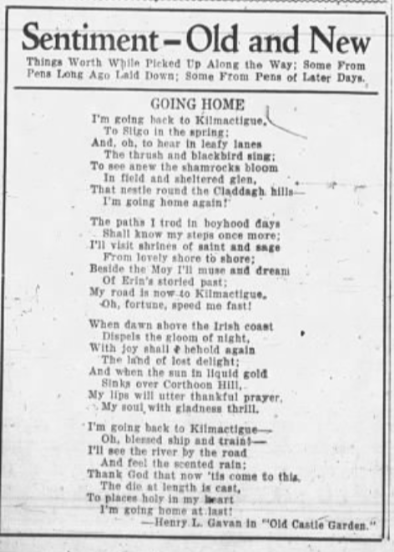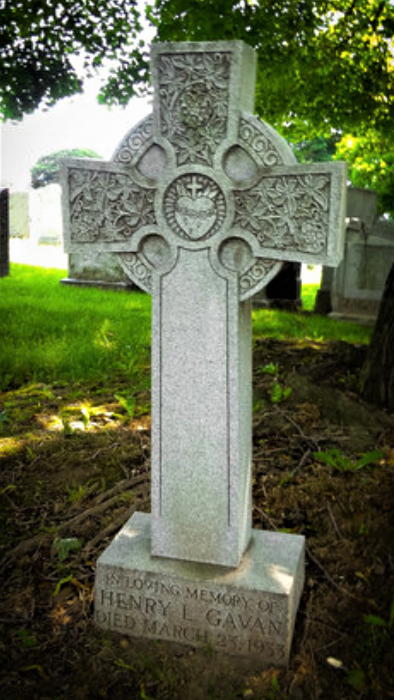Henry L. Gavigan - Sligo Poets
Main menu:
- Home
-
1912
- 1912
- Sligo Poetry 1912
-
1913
- 1913
- Sligo Poetry 1913
-
1914
- 1914
- Sligo Poetry 1914
-
1915
- 1915
-
Sligo Poetry 1915
- Sligo Newspaper Poems
- Sligo Champion
- Sligo Independent
- Sligo Nationalist
-
1916
- 1916
-
Sligo Poetry 1916
- Sligo Newspaper Poems 1916
- Sligo Champion
- Sligo Nationalist
- Sligo Independent
- The Poets
- Bibliography
- The Author
Henry L. Gavigan (1872-

When Henry L. Gavigan died in New York in 1933, a work colleague described him in the following terms, "In all my years I have never known a finer character, a more forgiving man. No, coarse, vulgar or double-
Born in Claddagh in December 1872, Henry seems to have been the tenth of eleven children born to Patrick Gavaghan and Mary Henry. Patrick was a native of Claddagh, Kilmactigue, but Mary was from the townland of Cloonbaniff, near Knocknashee. The family lived in a small cottage and survived on a farm of about twelve acres. It would seem that nearly all the family emigrated to America. James, known locally as ‘Robinson’, remained with his mother in the home place.
Henry seemed very much to enjoy his childhood and was able to take full advantage of time spent at Knox National School and later at Kilmactigue. There he was taught by the local schoolmaster, James McIntyre. McInytre was his uncle by marriage and was a man that Henry very much admired, as indicated in his poem, Hallowed Paths:
And here across the water, while the strivings of the mart,
All but distract me, old Knox school lives ever in my heart
And McIntyre, the Master – God who guides us keep his soul;
Methinks I hear his shadow voice, calling the shadow roll.
Henry departed for America in 1893 at the age of twenty-
Joseph was established there as a journalist and he may well have been the one who decided that the family name needed be changed to, Gavan. This decision was well enforced because every single sibling that went to America subsequently, used this new version surname. It seems that the eldest brother, Anthony, who continued to use the name, Gavigan, had got himself into a bit of trouble and this was the main reason why his brothers and sisters subsequently changed the family name.
The family quickly began to prosper in New York. Henry eventually joined the US Postal Service and through time, went from being a lowly clerk to a head of department. Joseph became a lawyer but later returned to newspaper work as a managing editor of a daily New York newspaper. Anthony, after his early troubled days, became a lawyer as well as a journalist and author.

A fourth brother, John, worked on the trains, married and went on to have a family whose descendants still live in the New York area today. A sister, Annie, seemed to have kept house for Joseph and Henry for many years. Annie, incidentally was the most prolific poet of all the family, having her poems published regularly in newspapers and periodicals right up to the mid-
While the family were all highly literate, Henry became the most noted penman among them. His works were printed regularly in the US and in Ireland, most notable in the pages of Old Moore’s Almanac. His poems were imbued with a great love of Ireland, Kilmactigue and his native Claddagh. One example of his poetic style appears in his poem, The Hills of Kilmactigue, brought to popular attention in recent years through the singing of Colm O’Donnell.
Of Kilmactigue I’m truly proud, no matter where I stray,
Far from that land, my own so grand, my native heath so gay.
Where e’er I roam I think of home, fond memories ever fly
To boyhood village days I passed in dear old Kilmactigue.
Without exception, all of these Gavaghan/Gavigan/Gavan children displayed a great love for their mother, who continued to live in Claddagh until her death. This unfailing adoration is profoundly illustrated in an elegy written by Henry, on hearing of the death of his mother in 1921.
Dear breast that pillowed my baby head now cold in the shrouding clay,
Would God I could kneel in Kilmactigue by your sainted grave to-
I would weep till my eyes ran dry of tears and find in that flood relief,
For the aching heart and the empty years and the depth of a wordless grief.

Henry was a regular on the social scene in New York throughout his life. He was a keen fiddle player and was referred to in one newspaper report of the time as; "The Irish tenor, Henry L. Gavan."
He was an inveterate writer of letters to local and national newspapers, usually highlighting the need to honour some great Irish writer or patriot. He loved the poetry of Oliver Goldsmith and was an avid supporter of the cause for Irish freedom. He made many return trips to Ireland, among them a visit to his mother in 1911 and his last, to attend the Eucharistic Congress in Dublin in 1932.
Henry Lawrence Gavigan; pilgrim, patriot, poet and proud son of Claddagh, died suddenly on the 23 rd of March, 1933 in a Manhattan hospital. He is buried is Calvary Cemetery in Queens.
Pat McCarrick, Cloonacool. September 2020.
Pat McCarrick is a first cousin, two generations removed, of Henry L. Gavigan and he is currently researching his life and works. Pat will publish a biography and the collected works of The Claddagh Poet later in 2021.